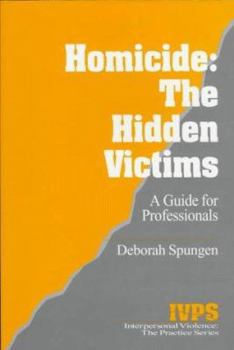Homicide: The Hidden Victims: A Resource for Professionals
Select Format
Select Condition 
Book Overview
The author of this groundbreaking volume is not only a social scientist and victim advocate; she is also the mother of a murder victim. Deborah Spungen illustrates how and why family members become co-victims when a loved one is murdered, and she poignantly addresses the emotional, physical, spiritual and psychological effects of such traumatic events. These "invisible victims" often find their wounds compounded by confusion and a sense of aloneness...
Format:Paperback
Language:English
ISBN:0803957777
ISBN13:9780803957770
Release Date:October 1997
Publisher:Sage Publications, Inc
Length:296 Pages
Weight:0.15 lbs.
Dimensions:0.8" x 6.0" x 9.0"
Customer Reviews
4 ratings
An overview of the issues, plus practical advice
Published by Thriftbooks.com User , 14 years ago
This book is in many ways a typical SAGE title. It is pricey, encyclopedic and oriented toward a professional audience. It is very systematic and broken down into numerous subdivisions, few of which are more than a page and half long. The tone is the typical scholarly-yet-practical sensibility of SAGE (which, as a disclosure, I should say once paid me $75.00 to review a book proposal). The book has two audiences. The first is the one professional: caregivers (social workers, therapists, etc.), police and anyone else, like judges, who might work during the course of their job with relatives and friends of murder victims. As the subtitle suggests, the tone of the piece is very much geared toward these professionals. The other audience is `co-victims', those who were close to the murder victim and suffered the most emotional fallout. This book isn't exactly oriented toward them but given the dearth of books directly focused on their needs, they might find it useful, especially in reassurance that what they are experiencing is not unique. (And much of the advice for professionals is on what to say to co-victims, so them reading this `cuts out the middle-man' in a way.) The first part of the book is a blanket overview of murder, its variations and its impacts on co-victims (all in a US context). This section is mainly meant to be descriptive, though I found the discussion of potential cultural differences too short to be illuminating. This is only `how to' in the sense that many of the sections give a brief example of egregious insensitivity toward co-victims. These anecdotes can be reverse engineered into a catalog of what not to do. The second part of the book is on more practical needs of professionals working with co-victims, starting with how to notify co-victims of the murder and ending with how to assist in dealing with the legal system and the media. Some of this is common sense; some of it, like establishing whether you are `subpoena proof' from defense attorneys, is not. Overall, there are probably a number of professionals -- a high number of professionals -- who could benefit from awareness of the material. At a minimum, it'll decrease the chances of their saying or doing something that hindsight will prove to be tactless. (Spungen is particularly critical of police for being thoughtless in their interactions with co-victims and being comfortable with being thoughtless.) The curious moments of the book, what you normally don't find in a SAGE title, are the author's brief and scattered comments on her own experiences. Unless you read Spungen's other book, you're not likely to ever read a passing comment about Saturday Night Live having a skit about the murder of an author's daughter. This is likely to have you doing some searches on Wikipedia, which could very well leave you trying to reconcile knowledge of a cultural event/circus of the voyeuristic morbidity with the practical tone of this book written by someone who had to live with
Outstanding book for all involved (not just "professionals")
Published by Thriftbooks.com User , 16 years ago
I think this is the best book written on an overlooked and poorly understood subject--the victims "left over" after a homicide. Every homicide leaves beind friends, family, loved ones, all of whom are really left out of the criminal justice system and often abused or treated very badly by that system. The author deals with all of the issues people need to face--especially things like unresolved grief which many people, including therapists, don't really understand. The grief experienced by these 'hidden' homicide victims don't have outlets or forms of expression and are often just stuck in time, frozen emotionally from the point that they learn of the homicide. Deborah Spungen, the author, has both professional and personal familiarity with this issue and wrote a book that shines like a beacon of light for crime victims! She has also written a book sharing, in very raw honesty, her own story centering on the terrible murder and then media exploitation of her troubled daughter And I Don't Want to Live This Life: A Mother's Story of Her Daughter's Murder
Homicide
Published by Thriftbooks.com User , 23 years ago
Very thoughtful and well written.covers both the emotional and practical elements involving homicide and those left to deal witht the aftermath.
Amanda's review
Published by Thriftbooks.com User , 24 years ago
I am Unable to express in words what this book means to me, but i will try. I was overwhelmed by the feelings poured into this book and I found myself crying off and on. I have never lost anyone that I love and i hope to never share any of those feelings that you had to experience, but I still can see the pain. I just wanted to let you know that your book was extremely touching and i thouroughly enjoyed every minute of it. Amanda





